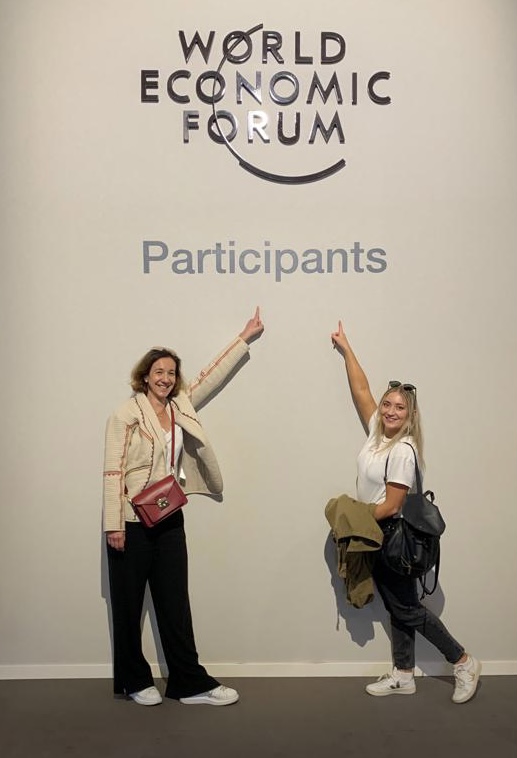Davos is a bit like marmite: synonymous with wealth, prestige and power, many businesses whose success rests on free trade and the ability to forecast economic trends, see it as an annual pilgrimage for mega-concentrated networking. Others decry it as a talking shop, and a façade for the most privileged 1% to travel by jet, sip cocktails and squeeze in some skiing between sessions.

So when I landed my first gig in Davos, many asked me to report back on my baptism of fire and the seeming contradictions that lie at the heart of the World Economic Forum’s Annual Meeting. What’s in it for attendees? Does it really promote sustainability? How can we make the most of the amazingly powerful people attending? And, for my two daughters, how many celebrities (recognisable by teens) can I spot?
Why go to Davos?
No one is so naïve to believe that five days up a Magic Mountain can solve the world’s most complex problems (the menu this year was: the war in Ukraine, the post-pandemic recovery, climate change and the gloomy economic outlook – in that order).
But equally, it has become trite to say that very few problems can be solved by Governments, businesses and organisations on their own. Most require a willingness to meet and understand others and a joint objective to drive change.

We’re quick to forget that this event was three times postponed, during which time we were unable to meet face-to-face and, let’s be frank, make the same connections online. And so even though it is elitist and ostentatious, Davos is genuinely a formidable platform where partnerships are created and nurtured.
On a personal level, being able to meet in person the CEO, CSO and supporting attendees of one of the US-based clients we were supporting here alone was worth attending. We got to establish a much closer relationship and I have no doubt it will lead to future, better managed and more impactful projects. I also got to bond with my two colleagues but let’s just stay that, in some cases, what happens in Davos stays in Davos.
Does Davos promote sustainability?
Not as much as it should. I’ve already mentioned Davos needs to walk the talk and what organisers could do to green it. And this year, the much-needed discussions on how to meet net-zero commitments, albeit bigger in terms of number of sessions and blog posts, were somewhat eclipsed by the urgency of dealing with the war in Ukraine.
Still, I would argue that some initiatives came out of Davos 2022 that are only made possible by a powerful group of businesses attending. For instance, a conglomerate of 50 companies, including Microsoft, pledging to buy ‘green steel’, aluminium and other hard-to-decarbonise commodities by 2030.
How can we make more out of this gathering of the rich and powerful?
When I worked for the Clinton Foundation, I had the opportunity to hear President Bill Clinton say that he created the Clinton Global Initiative (CGI) because he had been inspired by the opportunities Davos was creating but felt it lacked follow-up (hence CGI attendees had to make a commitment in health, climate change or education as pre-requisite for attendance).
This gap between intent and action is still present. WEF now does much more to identify leaders and galvanise them to take action. But I do feel that, unless it finds ways of asking members for better commitments and follow-up, it will continue to slowly erode its aura.
Another very obvious improvement could be the dire representation of women at the event, peaking at 24% in 2020, when strong, composed and inspiring women stole the show this year: Ursula von der Leyen fearlessly stating Ukraine must win the war; Christine Lagarde, the ECB Director, ‘refusing to create the headlines’ while offering a razor sharp analysis of Europe’s economic vulnerabilities, and Kristalina Georgieva, the IMF Director, stating how she “hated” growing up on the other side of the Iron Curtain and her claim we’re “ sleepwalking after the hot war into another cold war”.
As to celebrities…
I suspect that, like my daughters, some of you kept reading for this bit of information: I spotted Liev Schreiber – whose grandfather was of Ukrainian and Polish descent – on the Promenade dodging the rain and Al Gore jogging alongside his bodyguard.
Next year, perhaps Davos could improve by bringing back Angelina Jolie.



